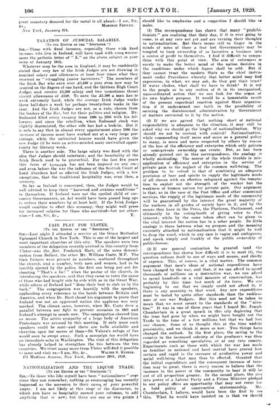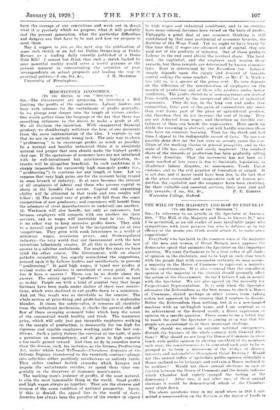NATIONALIZATION AND THE LIQUOR TRAM. [To 3BE EDITOR OF THE
A' SPECTAT011.73 'SIR,—To those who like ;nyself have been " nationalizers " ever since they can remember, nothing so encouraging has recently happened as the ,accession to their cause of your powerful paper. I am not likely at this stage of the discussion, to which you have so hospitably opened your columns, to add anything that is new; but there are one or two points 1
should like to emphasise and a suggestion I mould like to make.
(1) The correspondence has shown that _many "-prohibi- tioniets" are realizing that their -day, if -it is ever going to come, is at any rate not yet and are turning their thought to nationalization. B*t there seems still to linger in the minds of some of these a fear lest Governments may be tempted to turn ownership of so lucrative a business into a source of profit to th,eroselves. I find it difficult -to sympa- thize with this point of view. The aim of reformers is surely to make the better mind of the nation decisive in the conditions under which liquor shall be sold. But if they cannot trust the modern State as the -chief instro, ment under Providence whereby that better mind may find expression, in what, we may ask, do they put their trust? If water chokes, what shall we hare to drink? 'It is not to the people or to any section of it in its unorganized, unco-ordinated action that we can look for the organ of its own highest purpose. It would be a lamentable result of the present superficial .reaction against State orgeniza, tion if it undermined our faith in the possibility of securing the disinterested administration by Government of matters entrusted to it by the nation.
(2) If we are Agreed that nothing short of national responsibility is adeqnute to the situation, it may still he asked why we should go the length of nationalization. Why should we not be content with control? Nationalization, while commending itself more and more as a general -policy to many, is more and more suspected by others by reason of the loss of the efficiency and enterprise which only private or semiprivate ownership can create. But, as has -been already pointed out in this correspondence, the analogy is wholly misleading. The source of the whole trouble is vals- application -of efficiency and enterprise in the service of private gain to the neglect of the .common well-being. The problem to be -solved is that of combining an -adequate provision of beer and spirits to supply the legitimate -needs of all classes with an effective safeguard against the -tempta- tion to exploit not the steength of the worker bat tors weakness of human nature for private gain. Our ,argimient is that, as in the case of the Post Office and other -corammial services, the supply of the legitimate needs of the community will be guaranteed by the interest the great majority of the workers in all grades of society have in it, and bey the means they have in the Press, the Platform, Parliament, and ultimately in the voting-booth of giving voice to that interest; while by the same token effect can he given -to the vital interest the nation has in a sober people. So little analogy is there between what we propose and the meaning currently attached to nationalization that it might be well to drop the word, which in any case is vague and ambiguous, and speak simply and frankly of the public ownership of public-houses.
(3) If our general contention be granted (and the correspondence has shown how difficult it is to meet it), the question reduces itself to one of ways and means, and chiefly of expense. This, of course, is a vital matter. The common argument that men's ideas of uationel expenditure here been changed by the war, and that, if we can .afford to spend thousands of millions on a destructive war, we can afford to spend hundreds on a vital measure of construction, has probably by this time lost much of its force. We are beginning to see that we simply could not afford it, if there is any meaning • in that word. Any new expenditure must he tested by quite other standards than the reckless- ness of our war Budgets. But this need not be taken to mean that we must _revert to the standards of the " nine- ties." It was in one of those years that I heard Mr. loeeph Chamberlain in a great speech in this city deploring that the time had gone by when we might have bought out the Trade to the tune of a few millions -but that we had lost our chance. Some of us thought this at the time unduly pessimistic, and we think it more so now. Two things have changed the outlook. In the first place, the saving to the country in the increased sobriety of the producers was then regarded as something sneculative, or at any rate replete. Experiments such as those with which the war has made us familiar in national and local control have proved how certain and rapid is the increase of productive power and social well-being that may thus be effected. Granted that the initial expenditure and the consequent increase of taxa- tion may be great, there is every reason to believe that the increase in the power of the community to hear it will be out of all proportion greater. In the second place, the rise into power of a Labour Party and a Prime Minister pledged to our policy offers an opportunity that may -not recur for a bold policy of constructive statesmanship. Mr. . Chamberlain, I believe, would have been the first to see this. What he would have insisted on is that we should
hare the courage of our convictions and work out in detail what it is precisely which we propose, what it will probably Lost the present generation, what the particular difficulties and dangers are that have to be met and how we propose to meet them.
May I suggest to you as the next step the publication of some such sketch of an Ad for Public Ownership of Public Houses as a leading daily recently published of a Home Rule Bill? I cannot but think that such a sketch backed by your powerful weekly would serve a useful purpose at the present moment in concentrating the attention of your Correspondents on actual proposals and leading the way to
practical polities.—I am, Sir, &c., J. H. Mumme. University of Birmingham.



































 Previous page
Previous page